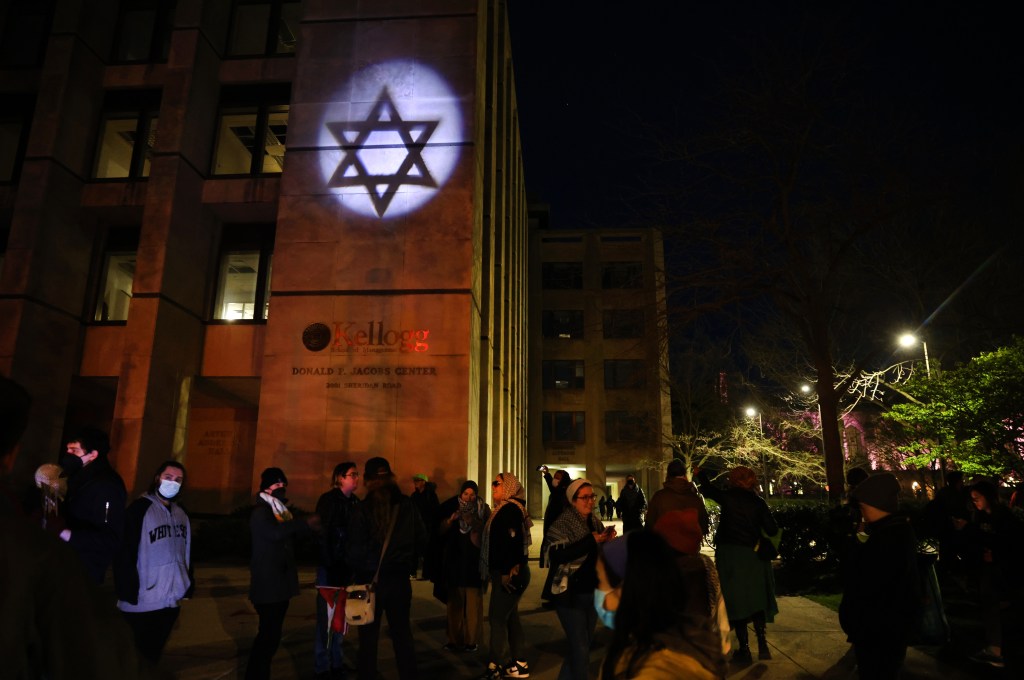Over the past seven months, colleges and universities have scrambled and often failed to respond to rising antisemitism on campus. Often under pressure, many formed committees that have largely come up short.
Here at Northwestern University, where I am a student, the formation of the President’s Advisory Committee on Preventing Antisemitism and Hate in November was met with resistance.
Many in my community scoffed at it as an attempt to save face with the sprawling network of Jewish students, parents and alumni that was showering the university with criticism. I disagreed with that characterization.
While skeptical, I remained adamant that the committee’s formation was a good-faith effort to explore solutions to pervasive and persistent antisemitism on campus and make significant improvements to the hostile environment Jewish students were facing. I had to believe, across the board, American universities were heading in the right direction and truly trying to support their Jewish students.
However, earlier this month, as the sole Jewish student representative on the committee, I resigned my position alongside six fellow Jewish members.
Nationwide, committees have been tasked with creating the conditions on campuses across the country for all community members to thrive, especially on improving the environment for Jewish students.
While intended to create an infrastructure for future conversations about Jewish and Zionist students’ experiences, the committees are so limited in the actions they are actually able to take that they are rendered useless. I no longer see Northwestern’s committee as paving an effective path forward — and instead have come to understand how completely performative these task forces are.
The Northwestern committee is not unique in its ineffectiveness. Rabbi David Wolpe resigned from Harvard University’s committee in December because he was not confident that he would be able to make the difference he had hoped by remaining on it.
By design, these committees are doomed to fail. While valuable in a campus environment to include a variety of identities and perspectives, Jewish voices are too often minimized as non-Jewish ideas about the experience of antisemitism are given equal weight.
Our own committee even placed an emphasis “on ensuring the physical, emotional and psychological safety and well-being of Northwestern’s students.” However, as one of only two students present, I regularly felt emotionally and psychologically disregarded. My personal experiences were dismissed and my voice ignored in favor of scholarship, research and academic credentials.
While I value using data-driven solutions and tapping into the vast educational resources available to us, it was belittling and dehumanizing to hear the Jewish student experience diluted to something that scholarship disagreed with — and therefore it was not addressed.
Jewish students don’t need data, scholarship or research to know that antisemitism is a problem at every American university. Our experiences define that reality.
When “antisemitism committees” refuse Jewish members the permission and platform to define their own identities and the hate they face, when committee members cannot even agree on what antisemitism is and when Jewish members are spoken over and shut down in discussions of their own experiences, what is the point of having the discussions at all?
The breaking point for me was the inability of the Northwestern committee to come to a consensus on whether to condemn antisemitism.
During the protests and encampment at Northwestern, a Star of David was drawn and crossed out on a sign and the university’s Jewish president was depicted with horns. “Death 2 Israel” was graffitied on a campus building and protesters chanted “globalize the intifada,” encouraging violence against Jews.
Yet, the committee could not agree to forcefully condemn these blatant and vile acts of antisemitism. If a committee intended to prevent antisemitism and hate not only fails to prevent but also fails to agree to call out antisemitism, I have no faith left in its ability to serve Jewish students.
My resignation is not a sign of defeat. Rather, it is an acceptance of a reality I don’t have the power to change on my own.
In my time on Northwestern’s committee, I learned one valuable lesson: how to take and use my seat at a table that didn’t seem to be built for students. Jewish students are largely alone in this fight for their comfort, safety and inclusion on campuses — it’s on us to make our voices heard.
I encourage Jewish students to continue reporting antisemitic incidents and to continue reaching out to your administration with concerns, questions and ideas every chance you get.
But I also encourage you to look outward for pathways forward and to lean into external pressure sources, such as media interviews, larger organizations and alumni and donor groups. Seek opportunities to support your community on your campus and prove that, together, the Jewish people are unbreakable. Most importantly, continue being loudly and proudly Jewish — Zionism and all.
That’s exactly what I’ll be doing for my final month at Northwestern and beyond.
Lily Cohen is a senior at Northwestern University.
Submit a letter, of no more than 400 words, to the editor here or email letters@chicagotribune.com.


